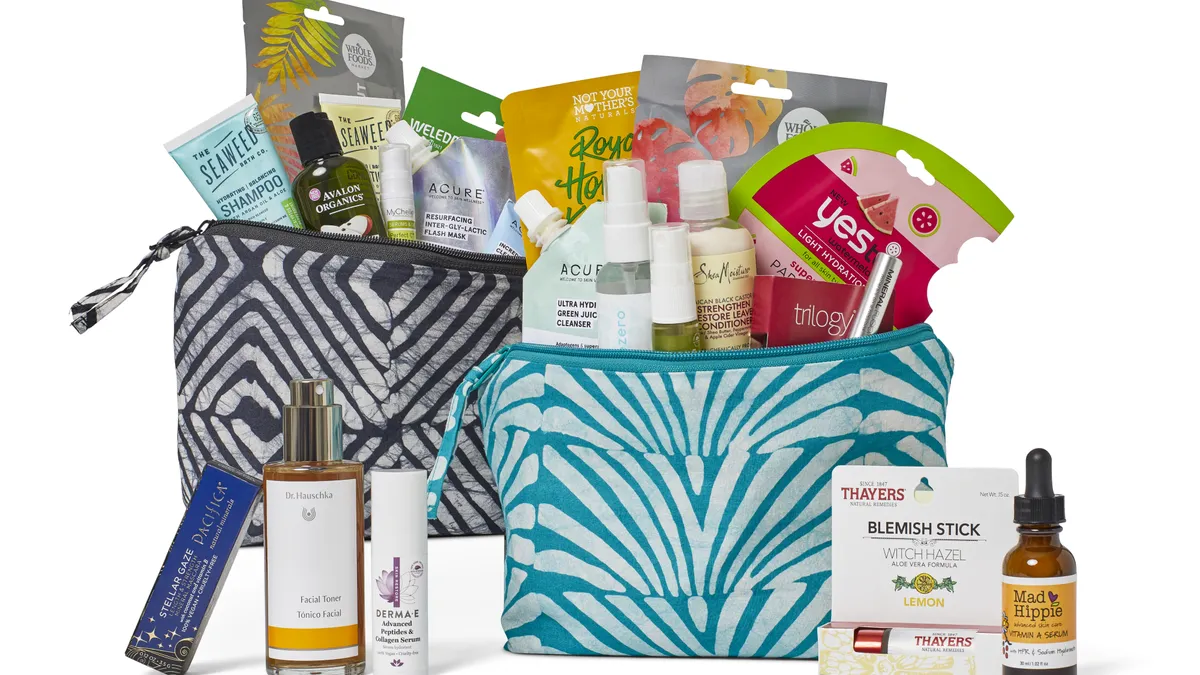Dive Brief:
- To celebrate its annual Beauty Week, Whole Foods’ global beauty buyers and experts have predicted the top five beauty and wellness trends for 2020, according to a press release. The list includes bakuchiol, a retinol alternative; blue light defense, which fights damaging indoor lights; watermelon infusion, which has natural antioxidants to brighten and hydrate; glycolic acid, a natural alpha-hydroxy acid (AHA) chemical exfoliant; and body masks.
- Beauty Week will run between March 27 and April 2, and will offer shoppers 25% off all makeup, facial care, hair care, nail polish, perfume and brushes. Amazon Prime members get an additional 10% off.
- Whole Foods body care bans more than 100 ingredients including phthalates, oxybenzone, triclosan, BHT, BHA and aluminum chlorohydrate. The retailer also requires third-party sellers to be certified organic on their personal care products.
Dive Insight:
Whole Foods wants shoppers to see it as a go-to source for products and expertise in the fast-growing beauty category. Its annual beauty sale and trends report targets one of the most popular buying times of the year, as shoppers are shaking off winter cold and looking toward spring and summertime.
In addition to its trends report and the corresponding discounts Whole Foods is offering, this year the chain will also sell limited edition beauty bags for $20 that include miniature and full-size products from popular clean beauty brands like Acure, Weleda and Mad Hippie. The bag is valued at more than $120.
To promote its Beauty Week last year, the retailer hosted a beauty swap event that allowed shoppers to bring in empty beauty or body care bottles and exchange it for a free Whole Foods beauty bag valued at $100. The limited-time bags were also sold for $20.
The push into beauty comes as Whole Foods seeks an edge against conventional, specialty and discount competitors. It’s a high-margin business that can offset low-margin grocery sales. With shoppers increasingly looking for natural products just as they are in food, Whole Foods has the opportunity to be the "cleaner" alternative.
Margins on beauty products range from 60% to 80% and last year the industry was valued at $532 billion with rapid growth expected, particularly from sustainable and clean beauty.
Competing grocers like Albertsons, Trader Joe’s and Wegmans have also recognized the opportunity with beauty. But many fail to properly analyze their customers to determine if they even have the credibility to offer beauty, Hana Ben-Shabat, a management consultant and advisor to beauty brands told Grocery Dive last year. Differentiating assortments and developing effective marketing campaigns are also crucial, she added. Whole Foods wide aisles, in-store signage and testers, as well as the events and buzz it creates surrounding beauty, are effective ways to draw consumers in, Ben-Shabat explained













